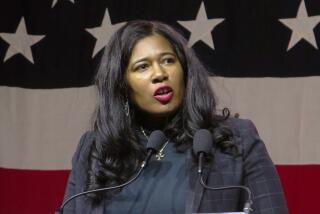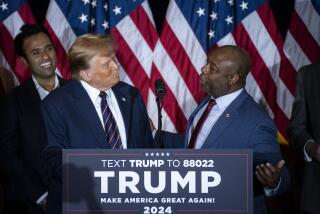In Detroit, Rand Paul says justice system treats minorities unfairly

The senator from Kentucky had an important question for Republicans in Michigan.
“How are you supposed to make child support payments if you’ve been in prison, and the best job you can get is $9 an hour?” Sen. Rand Paul asked, wearing a suit and tie at the opening of a new GOP office on Livernois Avenue in Detroit.
Child support, prison and the war on drugs are not usual topics for the GOP senator, who had previously gained media attention for launching a filibuster against President Obama’a nominee to head the CIA because Paul questioned the administration’s use of drones.
“These are things you haven’t heard Republicans talking about,” he said. “So I’m glad to be part of this today, not only just to mean that Republicans are showing up where we haven’t been, but with a new message and policy.”
Minorities shunned the GOP in the 2012 elections, with 93% of African Americans and 71% of Latinos voting for Obama, and the Republican Party has been trying to reach out to minorities. Paul’s visit to Detroit, where 85% of the population is African American, coincides with the opening of an African American outreach office by the GOP in the city and in other cities across the country.
The party has been unpopular lately in cities and has drawn much of its support from rural and suburban voters.
“Today’s opening of this office is the beginning of a new Republican Party,” Paul said. “This is going to be a Republican Party that is in big cities and small cities, in the countryside, in the city. It’s going to be about bringing a message that is popular no matter where you’re from, whether you’re rich or poor, whether you’re black, white or brown.”
In the short speech, Paul talked about how the so-called war on drugs has disproportionately incarcerated blacks and Latinos, and said he was advocating that judges have more discretion during sentencing in drug cases. He also mentioned that many convicted felons can’t vote and have trouble finding jobs, which makes their lives more difficult.
“Something has to change,” he said. “The war on drugs has gone awry.”
After its drubbing in 2012, the GOP launched a Growth and Opportunity Project that sought to remedy some of the party’s image problems. A report by the project in March suggested reaching out to minorities, including “Hispanic, Asian and Pacific Islanders, African Americans, Indian Americans, Native Americans, women and youth.” It also advocated reaching out to the poor, stating, “The perception, revealed in polling, that the GOP does not care about people is doing great harm to the Party.”
Last month, Republican Chairman Reince Priebus visited Detroit and announced that he had hired Michigan radio host Wayne Bradley as the state director of African American Engagement. He also unveiled the Michigan Black Advisory Council, a coalition of 13 Michiganders who will work with the GOP.
So far, minority outreach has had a rocky start. In a tweet earlier this month about Rosa Parks, the Republican National Committee said, “Today we remember Rosa Parks’ bold stand and her role in ending racism,” which incited mockery on the Internet for the statement that racism was over. The party corrected itself, saying, “Previous tweet should have read, ‘Today we remember Rosa Parks’ bold stand and her role in fighting to end racism.’” But the damage had been done.
Paul also talked about economics at a different stop in Detroit, introducing a plan to the Detroit Economic Club that he said would reduce taxes to 5% in economically distressed areas.
When asked about his aspirations for 2016, Paul was coy. “There’s two votes in my family “ he said. “My wife has both of them. Both of them are ‘no’ votes right now.
“So if I’m a very able politician, I’ll tell you in a year whether I’m able to persuade my wife. Right now, I don’t know yet.”
alana.semuels@latimes.comTwitter: @AlanaSemuels
More to Read
Start your day right
Sign up for Essential California for news, features and recommendations from the L.A. Times and beyond in your inbox six days a week.
You may occasionally receive promotional content from the Los Angeles Times.







